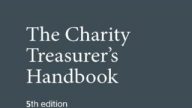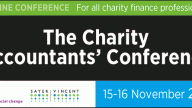5 top tips for treasurers of smaller charities
No matter the size of your charity, here are 5 helpful tips that every charity treasurer should know.
Even in the smallest of charities, being a treasurer is not simply about keeping a record of the money received and spent. Some people are often daunted by what the role may involve or reluctant to take on the position as they feel they are not qualified. You don’t need to be an accountant, finance professional or even have previous experience, but you do need to understand what the role involves. The following top tips are a starting point for taking on the treasurer role.
Know your charity
The charity sector is diverse, and not all charities are the same. Make sure you know your charitable objects – the purposes the charity is set up to meet – as the resources of a charity must always be used in the way the trustees consider will best advance these objects. You also need to know where your charity is registered, what legal form it takes, when your year-end is and the approximate income level of the charity. These all help determine who you need to report to, when and what form that reporting must take (there are three charity regulators in the UK, The Charity Commission in England and Wales, the Office of the Scottish Charity Regulator in Scotland, and the Charity Commission in Northern Ireland). This information can be found in your charity’s governing document and latest annual accounts.
Get to grips with fund accounting
Charities often receive income that is donated to them or from fundraising activities. Where this income is given or raised for a specific purpose, it forms a restricted fund, and trustees are responsible for ensuring the money is spent accordingly. This means charities can often end up with lots of different funds to manage. Fund accounting is the way to ensure all transactions involving income and expenditure are allocated to specific funds within the charity’s books. This is one of the most significant differences between commercial accounting and key to charity accounting.
Embrace technology
Charities have to deal with changing circumstances, and treasurers should engage with those digital and technological advances which help manage their workload. Accounting software, online banking, fundraising platforms and methods of cashless giving can all be useful tools for a small charity, but treasurer’s must ensure the necessary controls are in place when using technology to protect the charity’s resources.
Financial planning, sustainability and reserves
Treasurers have a key role to play in making sure their charity is financially robust enough to operate in line with its purposes and meet the needs of the beneficiaries. Preparing budgets and forecasts for the year ahead will help highlight what the charity has to spend, and what fundraising is needed. Calculating, and being able to explain, the amount of money your charity should hold in reserve in case it has to meet unforeseen costs or experiences a drop in funding helps make your charity more financially resilient.
You are not alone
The treasurer does not make the financial decisions alone. The role of the treasurer is to provide and explain the financial information in a way that all trustees understand so that they can make decisions collectively. This means the reports you prepare for the Board should be easy to read and not just a spreadsheet of numbers. Include descriptions, graphics and highlight important information for decision-making. Ask for support when you need it, your independent examiner or auditor should be able to help, the regulators provide useful guidance on their websites and there are reliable publications available such as The Charity Treasurer’s Handbook.
About the author
Elaine Alsop is a chartered accountant with 25 years’ experience, and working solely with charities and other third sector organisations for over 15 years. She advises small to medium-sized charities on a wide range of finance and governance issues, including annual reporting and independent examination.
Elaine has co-written DSC’s new book, The Charity Treasurer’s Handbook, with Gareth G. Morgan. The new edition is now available to buy, learn more here.


